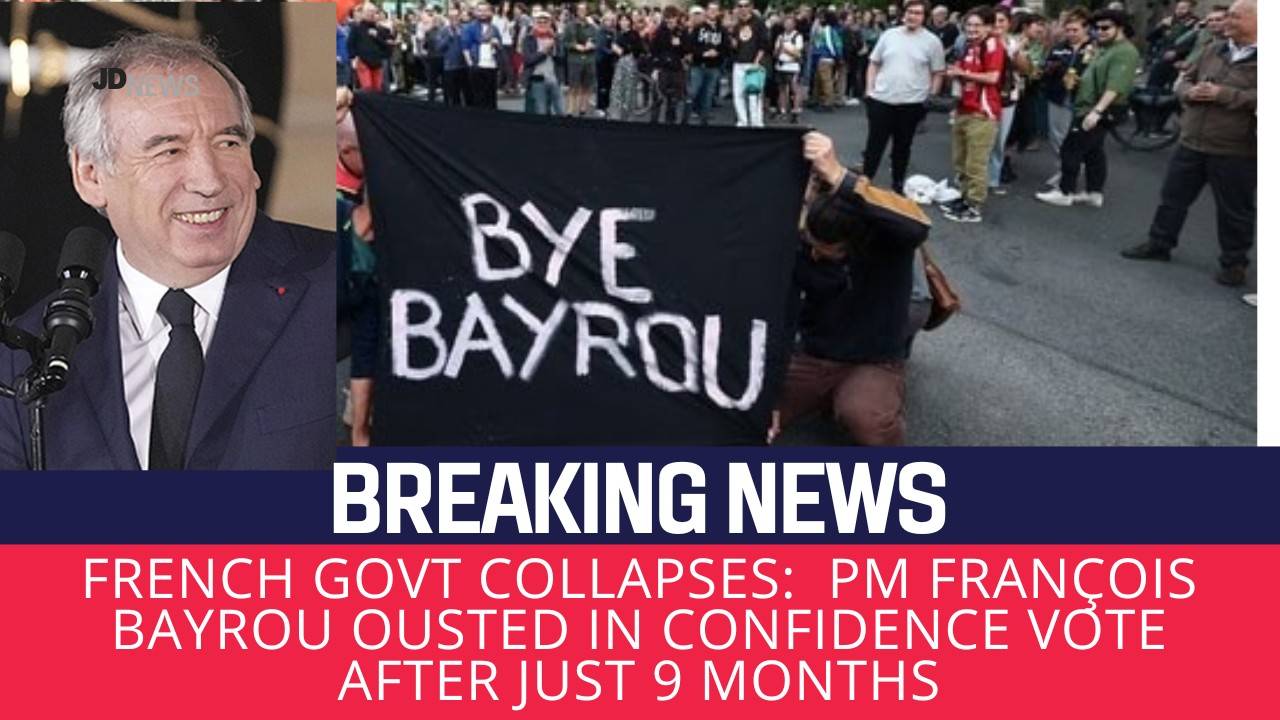French Govt Collapses: PM François Bayrou Ousted in Confidence Vote After Just 9 Months

In a spectacular political upheaval, French Prime Minister François Bayrou's cabinet has dissolved just nine months after entering power. The fall occurred when legislators in the National Assembly voted heavily against Bayrou in a high-stakes confidence motion over his contentious €44 billion austerity proposal. The proposal, which aimed to reduce government spending by cancelling public holidays and freezing expenditures, sparked fierce opposition and resulted in a crushing defeat that shook Macron's presidency.
A Crushing Defeat in Parliament
The confidence vote finished with 364 legislators rejecting Bayrou and only 194 supporting him, well exceeding the 280-vote threshold required to overthrow the government. The magnitude of the defeat left no space for doubt: Bayrou's fiscal approach received little political support, even from moderates. Bayrou warned before the vote that France must not ignore its swelling debt and rising spending, but his appeal failed to persuade a sharply divided parliament. Under Article 50 of the French Constitution, the prime minister must now resign, which Bayrou is likely to formalise during a meeting with President Emmanuel Macron.
Macron’s Dilemma: Who Will Lead Next?
The resignation focusses the spotlight on President Macron, who must now pick a new prime minister capable of navigating a divided parliament. Potential contenders include Defence Minister Sébastien Lecornu, Justice Minister Gérald Darmanin, and socialist veteran Bernard Cazeneuve. Finance Minister Eric Lombard and Court of Auditors chief Pierre Moscovici have both been touted as potential successors. While Macron has resisted calls for a snap election, opposition parties on the far right and hard left are increasing their demands for new elections, which could further destabilise French politics.
Austerity vs. Public Anger
At the core of the crisis is Bayrou's proposed 2026 budget, which calls for €44 billion in reductions to handle France's increasing debt, which is already 113.9% of GDP. However, the idea proved politically poisonous, causing outcry over cuts to public spending and holiday cancellations. Opponents dubbed the measure "political suicide" and accused Bayrou of forcing ordinary folks to shoulder the cost of economic reforms. The prime minister's gamble of attaching the austerity plan to a confidence vote failed catastrophically, putting Macron's cabinet in disarray and France's economic credibility in doubt.
What’s Next for France?
The coming weeks will be key as Macron considers his alternatives. He may decide to form a caretaker government while looking for a stable coalition partner, or he may swing to the centre-left in order to gain support. Meanwhile, France is bracing for a volatile September, with statewide rallies planned by the "Bloquons Tout" campaign, Fitch's credit rating reviews, and union-led strikes. The government's failure might exacerbate these issues, making France vulnerable to both political instability and economic downgrades.
For Macron, the removal of Bayrou means more than merely replacing a prime minister. It highlights the vulnerability of his second term and the dangers of ruling without a clear majority. The crisis has exposed significant political splits in France, as well as a public that is increasingly hesitant to accept austerity in the name of fiscal restraint. The next prime leader will inherit not only a fragmented parliament, but also a country prepared for turbulent times ahead.
Disclaimer: The information provided in this blog is for general news reporting purposes only. While every effort has been made to ensure accuracy, readers are advised to verify details from official government releases and trusted news outlets. This article does not represent any political bias or endorsement.
Disclaimer The information in this article is compiled from reliable news outlets including The Hindu, Times of India, CNN, and Reuters. While every effort has been made to ensure accuracy, readers are advised to cross-check facts before making conclusions. JDBulletin is committed to delivering factual, unbiased, and well-researched news.